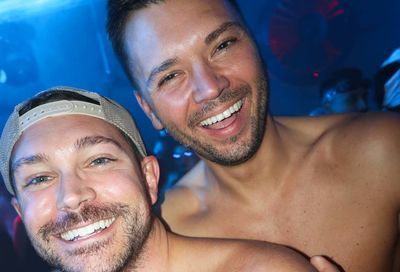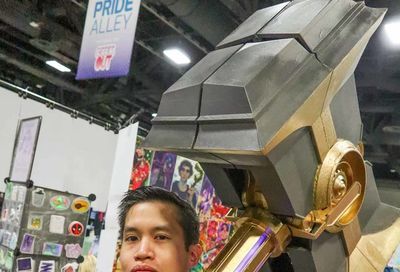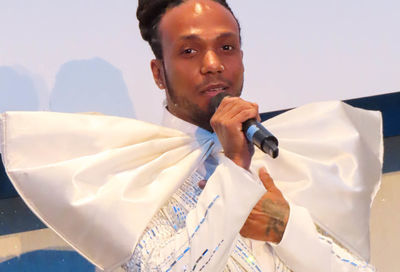Language of Love
Author Jamie O'Neill discusses his gay novel ''At Swim, Two Boys''
Irish author Jamie O’Neill flips intently through the pages of a book. Though it’s his own novel, At Swim, Two Boys, and he knows every syllable he spent ten years committing to print, he can’t find the passage he seeks. The pagination in the U.S. edition, just released in March, is different from the U.K. original, O’Neill grumbles.
But he’s more befuddled than perturbed. His tale of Irish teenagers Jim and Doyler, who fall in love, then fight at each other’s side in the 1916 Easter Uprising, was an instant sensation last year in England and Ireland. It’s already an American bestseller with a screen adaptation in the works.

Suddenly, his face brightens. “Here,” he urges, “read this.”
Grey morning dulled the bay. Banks of clouds, Howth just one more bank, rolled to sea, where other Howths grumbled to greet them. Swollen spumeless tide. Heads that bobbed like floating gulls and gulls that floating bobbed like heads. Two heads. At swim, two boys.
Looking up from the page to O’Neill, he’s staring dreamily out the windows of the sun-filled, well-appointed lobby of The Monarch, where he’s staying during a Washington, D.C. stop on a U.S. reading tour. He’s lost momentarily in the sound of his prose, perhaps entranced by the memories it evokes of his own boyhood in Dublin, or homesick for Galway, where he now resides with his boyfriend of eleven years.
O’Neill knows the words he chooses aren’t typical, aren’t always easy. But it’s the language of his culture, he explains, as he rolls yet another cigarette. Like any Irishman, O’Neill’s heritage is a complex one, molded by the struggles for liberation — both politically and, from O’Neill’s gay perspective, quite personally.
It all made At Swim, Two Boys a book written for himself as much as the wide readership it now enjoys. To write such a love story — love for country, love between young men — O’Neill knew he had to infuse it with every detail of language, location and history he could. It wasn’t the simplest path for an author to take, but it’s clear now that it was the perfect choice for O’Neill to make.
MW: Before we talk about At Swim, Two Boys, tell me about your first two novels, Disturbance and Kilbrack, or Who Is Nancy Valentine?
JAMIE O’NEILL: I’m very surprised they’ve even been mentioned in publicity for At Swim, Two Boys. They were published about seventeen years ago in a very small edition. I think my mother bought all the copies. I don’t even consider them my own work.
MW: Why is that?
O’NEILL: I was living with this guy for six years in England. He was what you’d call over here a talk show host, and he was one of England’s top television celebrities. Then he died at the same time my novels came out. I lost everything. I was homeless, living on the streets in London. I’ve changed since then. Those novels don’t seem like my previous novels, they seem like the novels of a previous incarnation of me. I’m a different person altogether now.
MW: How does being gay in Ireland compare to England or what you know of the U.S.?
O’NEILL: In Ireland, there isn’t that great weight of tolerance. “I tolerate you” — that’s very much a power in a relationship. You don’t feel that in Ireland. You can do anything you want there as long as you can buy a round. If you can’t buy a round, you’re hardly a human being. It’s no place to be poor. If I hadn’t written this book, I could have never returned there. You can only return to Ireland as a success.
MW: The ten years you spent on At Swim, Two Boys seems like a pretty long time for writing a book. Is that the normal pace of your work, or is it more of a reflection of the scope of the novel?
O’NEILL: The story grew with the telling of it, to tell you the truth. I describe the novel like a good lover. It angered me. It had me despairing at times. But it never bored me — the writing of it. My boyfriend, who’s been with me all through it, was convinced that I’d be dead before the book was finished and they’d be taking the pages from my rigor mortised fingers.
There’s a lot of research to do when you do a novel set in history. Research is quite a peculiar thing. I didn’t go to university, so I had to learn how to research as much as do the research — how to keep notes in a retrievable fashion to make sense of them all. Just to get the history right, just to get the swing of it in my head, I started in the sixteenth century.
MW: Do you consider yourself a self-taught writer?
O’NEILL: Well, I’ve never been to a school or anything. I was asked earlier this year to give a workshop on writing the novel. I had to write back and say, “Look, a year ago, I was the person who needed to attend such a workshop.” You don’t suddenly change once you get a book published. You don’t suddenly know everything. The only advice I could ever give to anybody is to be true and persevere. It doesn’t take a three-day workshop to tell people that.
MW: How much of an obligation did you feel to make sure your depiction of young male homosexuality in this period was authentic? It seems you’d run the risk of projecting too much of a modern gay perspective into the situation.
O’NEILL: It is a historical novel, but it’s supposed to be contemporary as well. It’s a way of looking at what’s happening in the world today through different spectacles. The whole notion is that two boys, in their friendship and their love, would discover their own country — a country, in the end, that would be worthy of their fighting for it. It’s a conceit, really. The Easter Uprising in 1916 was the birth of the modern Irish state. It was also around that time that what you might call a homosexual sensibility was beginning to form, after Oscar Wilde and everything.
Before the Wilde trials, it was usually — I’m going to give you some Latin now — pecatum inter Christianos non nominandum est: the sin, the crime, amongst Christians which couldn’t be spoken. What Oscar Wilde did was give words to it. He gave it a face, a humanity. Those words, to begin with, were words of terrible condemnation. But with words come speech, and only with speech can come understanding. That period was important.
MW: Is there a specific contemporary parallel you’re commenting on?
O’NEILL: In the late 1960s and ’70s, when there was such a thing as the Gay Liberation Front, I really think it’s a shame they didn’t shoot anybody. Because you get people going up in pulpits, or politicians, and they denounce people. I don’t mind being denounced myself, because I’m older and strong enough to deal with it. But kids listening to this and just coming to terms with their sexuality [are harmed by] being denounced from pulpits and television screens. It costs these people no courage to do that. They’re not risking anything. If we’d shot a few people back then when the time was right, when we had a very socialist call to revolution and arms, these people would be a bit more wary of what they’re saying.
MW: Did you ever consider setting the boys’ tale in another era?
O’NEILL: No. 1916 is the soul of my country. You don’t talk to your country any other way. Irish people are a bit annoyed about it in a way. It’s nearly a sacred event in Ireland, and some people are slightly appalled that I should be doing this. The other strand of Irish thinking is, “It’s all history. Why is he dragging that up? Why can’t he address our current concerns?” But see, my current concerns are being gay and Irish. This is how I address it.
MW: How much of your own experience growing up is reflected in the novel?
O’NEILL: I have to say that the closest I’ve come to these guys is being sixteen. I did go to the same school Jim goes to. Where they go swimming is called the Forty Foot, and that’s where I used to hang out when I was playing truant from school. I love that place. That coastline of south Dublin means freedom to me, because there’s a vista of the sea. That notion of eternity or infinity began there for me. There’s also something about swimming. There is this release from your bounds. It’s a nice feeling, especially in the freezing cold Irish sea.
MW: Did you grow up Catholic?
O’NEILL: Yes. I kind of like the Catholic Church. I like the words, the distinctions they have for sins. For example, “morose delectation.” Beautiful. It’s the dwelling on pleasure from sins already committed. I kind of admire something that’s seen so far inside the soul that it can work out names for these things. Of course, I don’t believe a word of it.
MW: How do you feel about the current sex abuse crisis in the Church?
O’NEILL: I’m a bit wary of all of this at the moment. On the radio phone-in programs in Ireland, you have men of forty calling in and crying on the air, saying, “This Christian Brother or something used to leer at them getting changed, or actually touched their private parts.” I think, “Stop. Come on, this isn’t a life-shattering event. You can get over this. You’re pushing yourself into being a victim of something that really didn’t matter.” We’ve just gone too far. When there’s abuse — real abuse — we’re diluting what is actually wrong. It’s big if somebody’s hurt you and exploited you, but sort of leering at you — I mean, for God’s sake. I did have a Brother who used to rub his hand up and down my leg. But I remember that Brother more because he didn’t hit me.
This is the thing I find extraordinary — the violence of the Catholic Brothers. You had to sit there while your friend, the guy at the desk next to you, was having the shit beaten out of him. You had to stare in front and pretend it wasn’t happening. It’s done awful things to the Irish psyche. People have been taught generation after generation not to care about somebody beside them being beaten up by a man. There’s a famous orphanage [run by the Brothers] in Dublin, and ten boys would take a shower at the same time. This was the rule. There were only nine cakes of soap. The boy without soap was whipped. So every morning, one boy had to be whipped.
MW: Why?
O’NEILL: Exactly. Why? This is the real, terrible abuse that’s going on. We’re going to be sending people to prison for however long because they touched somebody sexually. But we’re not paying attention to this terrible violence that goes on. People wonder why people shoot each other in Ireland. Well, they’re growing up with violence. It’s going on all around them.
MW: Has your book been reaching younger readers?
O’NEILL: I get e-mails from young people. I find it very inspiring and inspiriting when young people write to you. Books have a special place when you’re growing up gay. They convey a sense of morality, and a code of behavior — how to put up with yourself and get to know yourself. Usually you learn these things from your peers, or your school, or your family. But when you’re growing up gay, these avenues — for me, anyway — were closed off. It was very much an internal thing that was happening.
That’s where books come into their own. They show you characters — that this has happened before, that you will get through it and you may prosper. You can be part of the good world, the world that seeks nobility and has courage and pride. The heart hasn’t changed in a hundred years. The searching for nobility and pride that’s in all young people is still there.
MW: Did you read a lot growing up?
O’NEILL: No, I didn’t even read the books in my English course or my Irish course. I just couldn’t read. I liked going to the Forty Foot. I failed all my exams. The last exam you take in Ireland is called the leaving certificate, which you take around the age of seventeen. I decided I was really going to have to [study] for this exam, so I cleared out everything in my bedroom that could possibly distract me. In the end, there was just this novel called Ivanhoe that somebody gave me for Christmas years before. All I did for two weeks was read Ivanhoe. It was the first book I ever finished.
Yet I’d been writing before that. There was a television program in those days about this ex-spy named Jason King. He kind of swung around the glamorous capitals of Europe, wearing wonderful cuffed suits and things. He would solve the odd murder, then write a novel about it. I thought, “Jesus, this is the life for me. I’m going to be a writer.” I was a “writer” for a few years then. A friend of mine at school said, “Well, show us something you’ve written.” It hadn’t really clicked before that a writer writes. So that’s when I first started doing it. Though I’ve rarely finished things, I’ve never put the pen down since.
MW: What about the future? Will you write another novel?
O’NEILL: Not necessarily. I don’t need to. I love my book. I loved writing it. If I’m going to write again, I want the story, the words, to be tumbling out — to be battling themselves to be said again. I’d like to think that in some small way, I can add to the sum of human understanding. Unless you’re doing that, you’re just killing trees. It’s not as though the world is going to run out of things to read.
Having said that, the happiest place for me isn’t Galway or Dublin, or Ireland, or France. It’s the middle of a paragraph. When I was working on At Swim, Two Boys, I would be riding the bus, and the last sentence I’d written would still be ringing in my ears, and nothing else mattered but the positioning of an adverb. That’s happiness.
Support Metro Weekly’s Journalism
These are challenging times for news organizations. And yet it’s crucial we stay active and provide vital resources and information to both our local readers and the world. So won’t you please take a moment and consider supporting Metro Weekly with a membership? For as little as $5 a month, you can help ensure Metro Weekly magazine and MetroWeekly.com remain free, viable resources as we provide the best, most diverse, culturally-resonant LGBTQ coverage in both the D.C. region and around the world. Memberships come with exclusive perks and discounts, your own personal digital delivery of each week’s magazine (and an archive), access to our Member's Lounge when it launches this fall, and exclusive members-only items like Metro Weekly Membership Mugs and Tote Bags! Check out all our membership levels here and please join us today!






















